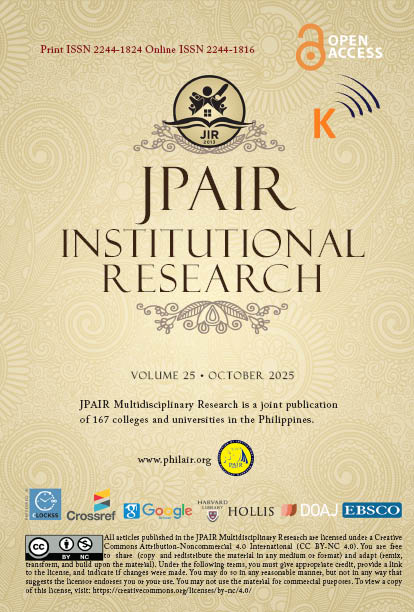Game-Based Approach as an Intervention in Enhancing Students’ Fraction – Solving Skills
DOI:
https://doi.org/10.7719/irj.v25i1.968Keywords:
Education, Game-based learning, fractions, solving skills, intervention, PhilippinesDisciplines:
Mathematics Education, Educational ResearchAbstract
Mastering fractions remains a significant challenge for students, with 96.53% (n=167) of Grade 7 students failing assessments covering addition, subtraction, multiplication, and division of fractions. To address this issue, this study investigated the effectiveness of Game-Based Learning (GBL) in improving students' fraction-solving skills. Using a quasi-experimental design, the research involved 20 Grade 7 students from a public junior high school. Data were collected through validated pre-test and post-test instruments, aligned with the problem set and rigorously assessed for reliability. The results revealed significant improvements across all fraction operations, with notable progress in addition (t = -3.75, p = 0.000), subtraction (t = - 8.35, p = 0.000), and multiplication (t = -4.42, p = 0.000). Although division remained the most challenging area (t = -1.910, p = 0.000), students still demonstrated measurable gains, suggesting partial success in bridging learning gaps. The findings highlight GBL as an effective pedagogical strategy for enhancing fraction proficiency, fostering an engaging, and student- centered learning environment. The approach's success is attributed to immediate feedback, contextualized practice, and increased motivation, making it a viable tool for improving mathematical competency. This study contributes to the growing body of evidence supporting GBL’s potential in mathematics education, particularly in addressing foundational challenges like fraction operations.
References
Ahmad, N. F., & Iksan, Z. (2021). Penerapan Kemahiran Proses Sains melalui Pembelajaran Sains Berasaskan Permainan Digital: Application of Science Process Skills through Digital Game-Based Science Learning. Sains Insani, 6(1), 75-81. https://doi.org/10.33102/sainsinsani.vol6no1.246
Department of Education (DepEd) (2022). DepEd, Microsoft Philippines engages students, teachers through game-based learning. https://www.deped.gov.ph/2022/04/28/deped-microsoft-philippines-engages-students-teachers-through-game-based-learning/.
Hamzah, N., Maat, S. M., & Iksan, Z. H. (2019). The effect of fun and interactive games as a strategy in teaching coordinates to enhance students’ performance in Mathematics. Religación: Revista de Ciencias Sociales y Humanidades, 4(22), 274-278.
Downloads
Published
Issue
Section
License
Copyright (c) 2025 Jason L. Torio, Jim Ryan V. Venturillo

This work is licensed under a Creative Commons Attribution-NonCommercial 4.0 International License.
Open Access. This article, published by JPAIR Multidisciplinary Research, is licensed under a Creative Commons Attribution-Noncommercial 4.0 International (CC BY-NC 4.0). You are free to share (copy and redistribute the material in any medium or format) and adapt (remix, transform, and build upon the material). Under the following terms, you must give appropriate credit, provide a link to the license, and indicate if changes were made. You may do so in any reasonable manner, but not in any way that suggests the licensor endorses you or your use. You may not use the material for commercial purposes.












